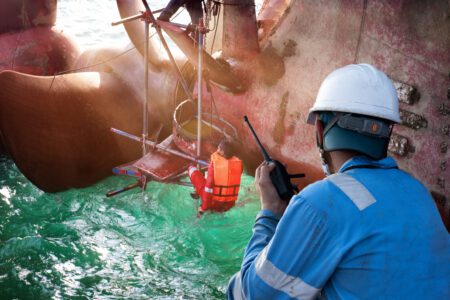Last Updated on March 6, 2025 by The Young Firm
Working in maritime industries comes with significant physical demands and risks. Heavy machinery, unpredictable weather, and strict deadlines create the potential for injury. Back injuries are some of the most common injuries maritime workers face, leading to long-term issues and often requiring extensive medical care.
If you’re dealing with a back injury from working at sea, you’re not alone – and you may need more than medical care to recover fully. Employers sometimes overlook safety regulations or fail to address hazardous conditions, which can result in serious back injuries. This is where a maritime accident injury lawyer can play a pivotal role, helping you seek compensation for the harm you’ve endured.
Here’s a look at some of the most common maritime back injuries and ways an attorney can pursue the money you deserve.
Common Types of Back Injuries in Maritime Work
Maritime work often involves physically demanding tasks and challenging environments, making back injuries a common issue for many workers. You might picture a simple strain or pull when you think of a back injury. However, back injuries vary widely in severity, especially in the maritime industry, where workers face unique risks. Some of the most common maritime back injuries include:
Herniated Discs
If you frequently lift or carry heavy objects on the job, you may be at risk for herniated discs. This injury occurs when one of the spine’s discs, which act as cushions between the vertebrae, slips out of place and presses against surrounding nerves. This can result in intense pain, limited mobility, and even numbness or tingling in your legs. The pain can be so severe that it restricts your ability to perform basic tasks, potentially leaving you unable to work for an extended period.
Herniated discs often develop due to improper lifting techniques or repetitive stress on the back. Employers should provide proper training on lifting techniques and, in many cases, lifting equipment to help prevent this type of injury. If they neglect to provide these resources, and you suffer a herniated disc, it might be a result of employer negligence.
Muscle Strains and Sprains
Muscle strains and sprains in the back are among the most common injuries for maritime workers. These injuries often happen due to sudden movements, such as twisting or bending while carrying heavy loads or operating machinery. A strain or sprain may sound minor, but in the back, it can cause persistent pain that lasts for weeks or even months. These injuries can significantly limit your range of motion and make daily tasks painful or impossible.
In a busy maritime environment, there’s often a rush to complete tasks quickly, leading to improper lifting techniques or inadequate posture. Employers should encourage workers to pace themselves and avoid overexertion. If you’ve suffered a muscle strain or sprain due to such pressures or lack of proper support on the job, you might have grounds to take legal action.
Spinal Fractures: Severe Injury from Falls and Impacts
A spinal fracture is a serious and often life-changing injury that occurs when a fall or impact causes a break in the vertebrae. In the maritime industry, these injuries can result from falls from ladders, decks, or even slippery surfaces. Spinal fractures usually require immediate medical attention, and the recovery process often involves extensive surgery and rehabilitation, potentially lasting months or even years.
Spinal fractures can severely impact your ability to work or even move comfortably, and they may lead to long-term complications. In cases where slippery surfaces or faulty safety equipment contribute to these falls, the employer’s responsibility to maintain a safe work environment becomes critical. If you experience a spinal fracture due to an unsafe condition that your employer failed to address, you can pursue compensation to aid in your recovery.
Nerve Compression
Maritime workers who spend hours bending, lifting, or working in awkward positions may experience nerve compression in the lower back. Nerve compression happens when nerves in the spine become pinched or compressed, leading to radiating pain that often travels down the legs. This condition can make it extremely difficult to perform physical tasks, limiting your range of motion and, ultimately, your ability to work.
Improper lifting techniques and a lack of ergonomic equipment can contribute to nerve compression. If your employer fails to provide the necessary tools or training to prevent this condition, you may be dealing with more than just a painful injury. Nerve compression can result in long-term functional limitations, leaving you unable to return to your previous job or requiring significant lifestyle adjustments. Seeking compensation can be essential to cover the costs of treatment and lost income during recovery.
Degenerative Disc Disease
Degenerative disc disease is a progressive condition where the discs in the spine deteriorate over time, often due to repetitive physical stress. Maritime workers who perform repetitive lifting, bending, or twisting motions are especially at risk for this condition. As the discs weaken, they lose their ability to cushion the spine, leading to chronic pain and potentially affecting mobility.
Employers who fail to implement rotation schedules, ergonomic support, or proper lifting techniques may contribute to the development of degenerative disc disease among their workers. If you suffer from this condition, an attorney can determine if your employer’s failure to address these risks contributed to your injury.
The Life-Altering Impact of Maritime Back Injuries
Each of these injuries can profoundly affect your health, career, and overall quality of life. Back injuries don’t just cause pain – they can limit your ability to work, perform daily tasks, and enjoy life as you once did. For maritime workers, back injuries are often career-ending, making it difficult or impossible to carry out the physically demanding duties required on a vessel or dock.
How Employer Negligence Can Lead to Maritime Back Injuries

Back injuries often arise from repetitive tasks, sudden strains, or insufficient rest periods. While some injuries may be considered part of the job, others stem from employer negligence, lack of proper training, or unsafe practices. Employers must maintain a safe work environment and implement safety measures to prevent these injuries. The following examples of employer negligence can lead to a maritime back injury:
Improper Lifting Training or Equipment
Many back injuries happen when workers lift or carry heavy loads without adequate support or equipment. Employers should provide lifting aids, such as cranes or pulleys, to minimize the need for heavy lifting.
Training workers on proper lifting techniques is essential, yet some employers neglect this crucial step to cut costs. When workers lift without knowing how to do so safely, they’re more likely to suffer injuries like herniated discs or muscle strains. If your employer didn’t provide training or adequate lifting equipment, they might be liable for your injury. A maritime accident injury lawyer can take proper action.
Slippery or Unstable Surfaces
Maritime workers operate on docks, decks, and vessel floors, where spills, oil, and water can make surfaces hazardous. Employers should promptly address spills or provide non-slip mats. But in many cases, these precautions are either missing or inadequate, leading to frequent slips and falls. A slip can result in more than just a bruised knee – falling onto a hard surface can fracture vertebrae or cause other serious back injuries. If you’ve suffered an injury in a preventable slip, an attorney can work to prove the employer’s negligence.
Inadequate Rest and Overexertion
Many maritime jobs require working long hours, often with minimal breaks. Fatigue can easily set in when a worker operates heavy machinery or moves large objects without sufficient rest. Overexertion from constant, strenuous activity often leads to muscle strains and degenerative issues in the spine. When employers disregard the importance of rest breaks and push workers too hard, they may be responsible for any injuries.
Faulty or Poorly Maintained Equipment
In a maritime setting, equipment failure can have serious consequences. Lifting equipment, cargo carriers, or machinery used for loading and unloading can all be hazardous if not maintained. When equipment malfunctions, it often causes sudden jerks or shifts that place undue pressure on the worker’s back. A maritime accident injury lawyer can determine if poor equipment maintenance contributed to your injury and guide you in pursuing justice.
Lack of Safety Procedures
Some employers skip essential safety protocols to speed up operations. They may ask workers to carry loads alone, work without adequate back braces, or forego safety harnesses. If your injury resulted from an unsafe practice that safety protocols would have prevented, you can seek compensation for the employer’s negligence.
How a Maritime Accident Injury Lawyer Can Help You
A maritime accident injury lawyer can provide the legal support you need to secure compensation. They understand injured workers’ challenges and can work with you to build a case based on the employer’s negligence. Here’s how they can help:
Gathering Evidence of Employer Negligence
Proving employer negligence isn’t always straightforward. A maritime accident injury lawyer knows what evidence to gather, from eyewitness statements to records of unsafe conditions. They can also review your company’s policies on safety to establish that your employer failed to meet reasonable standards of care.
Calculating Damages Beyond Medical Bills
A skilled attorney can calculate the full range of damages you’re entitled to, including lost income, reduced earning capacity, and pain and suffering. For long-term back issues, they’ll factor in the costs of future treatments and rehabilitation, ensuring that your compensation reflects the full impact of your injury.
Handling Insurers and Legal Tactics
Insurance companies are often reluctant to offer fair compensation, and employers may try to shift the blame. A maritime accident injury lawyer can represent you in negotiations, ensuring that insurers don’t undervalue your claim or take advantage of your situation. They can take your case to court to fight for a fair settlement if necessary.
Building a Case with Industry Regulations

The maritime industry has numerous regulations governing safety practices. Your attorney can reference these regulations in your case, highlighting instances where your employer failed to meet the required standards. Your lawyer can strengthen the argument for employer negligence by tying your case to specific industry regulations.
Securing Compensation for Long-Term Implications
A serious back injury can have lifelong implications, from chronic pain to limited mobility. Your attorney will work to ensure that you’re compensated for all long-term effects. This can be critical for those needing to transition to less demanding work or can no longer work in the maritime field.
Scenarios Where Injured Workers Could Pursue Compensation Due to Employer Negligence
Here are some hypothetical scenarios where injured maritime workers might pursue compensation with the help of an attorney:
Faulty Loading Equipment and Neglected Maintenance
Imagine a dockworker injured after a crane malfunctions, causing a heavy load to drop unexpectedly. The sudden impact results in a severe back injury, potentially including fractured vertebrae. An investigation might reveal the employer skipped regular maintenance on the crane to save time, putting the worker at unnecessary risk.
In such a scenario, the injured worker might pursue compensation by gathering maintenance records, inspection logs, and reports showing the employer’s disregard for equipment upkeep. A maritime accident injury lawyer can use this evidence to demonstrate employer negligence.
Overloaded Shifts Without Proper Rest
Consider a deckhand required to work back-to-back 16-hour shifts due to staffing shortages, with little opportunity for rest. If this leads to a serious back strain, the worker can argue that the injury resulted directly from the employer’s failure to provide adequate breaks and rest periods.
An attorney can strengthen this case by obtaining work schedules, testimony from other employees, and documentation showing the employer’s demands on their crew. This evidence can help establish that the injury was due to an employer’s negligence in pushing workers to the point of physical harm.
Unsafe Cargo Handling Without Proper Lifting Equipment
Picture a cargo handler who suffers chronic back pain after repeatedly lifting heavy loads without lifting aids or adequate assistance. If the employer failed to supply necessary equipment or ignored the worker’s requests for help, this can be grounds for pursuing compensation.
A maritime accident injury lawyer can support the worker’s claim by documenting complaints from other employees, evidence of equipment shortages, and witness testimony showing how the employer consistently disregarded safety. In this case, the employer’s negligence in failing to provide a safe working environment will be a critical element of the claim.
Protect Your Rights By Hiring a Maritime Accident Injury Lawyer

Your employer may not prioritize your well-being, but a maritime accident injury lawyer can. They aim to ensure you’re compensated fairly for your injuries, lost earnings, and any future limitations caused by your injury. Holding your employer accountable can help foster a safer work environment for all maritime workers.
Don’t let an injury disrupt your life and career without taking action. Seek the help you deserve to recover and move forward, knowing that someone is advocating for your rights.

